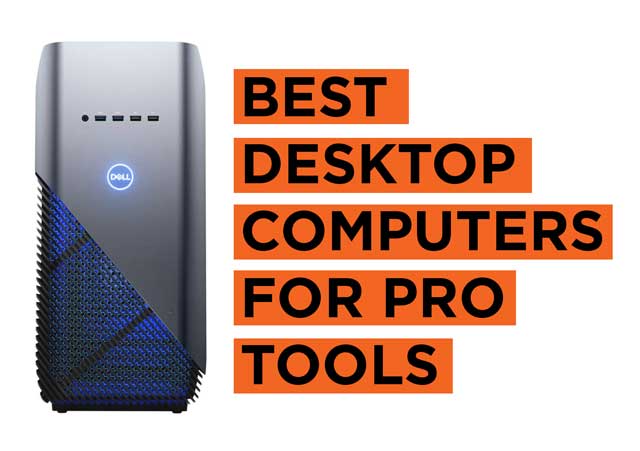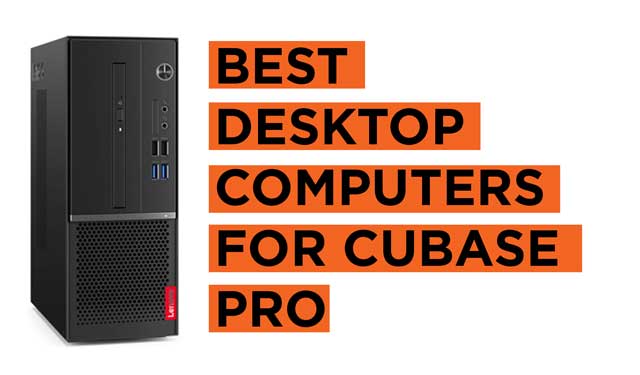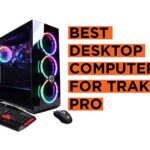This guide is for audio engineers, music producers, post-production specialists, and serious home studio creators who use Pro Tools for recording, editing, mixing, and mastering.
We’ve worked in Pro Tools long enough to know what it demands: stability, real-time responsiveness, and low-latency performance. Few things are more frustrating than a CPU overload error mid-take, a plug-in chain that chokes playback, or a system crash during bounce-to-disk. These issues don’t come from Pro Tools itself, they stem from underpowered or unbalanced systems.
The challenge with building or buying a desktop for Pro Tools lies in knowing how it works. Pro Tools is sensitive to CPU design, RAM availability, storage speed, and interface compatibility. Unlike some creative applications that rely heavily on GPU acceleration, Pro Tools is CPU-centric, and the architecture of that CPU (core speed, thread distribution, and cache) plays a significant role. Add in audio interface drivers, AAX plug-in processing, and real-time audio rendering, and your system must be both powerful and predictable.
We’ve selected desktops based on six key factors: Processor, RAM, Storage, Audio Interface Compatibility, Expandability, and Thermal Design. Each recommended machine meets or exceeds these baseline specifications, ensuring solid Pro Tools performance for tracking, mixing, and post:
- Intel Core i7 or i9, or AMD Ryzen 7/9, with clock speeds of 3.5GHz or higher
- At least 32GB of RAM, with expansion to 64GB for large sessions
- 1TB NVMe SSD, with additional high-speed storage for sample libraries or stems
- Quiet cooling, with low system noise for recording environments
- Full compatibility with ASIO/Core Audio interfaces and expansion cards (e.g., HDX or Thunderbolt)
Processor (CPU)
The CPU is the heart of Pro Tools performance. Most audio tasks, like running plug-ins, routing busses, and real-time audio calculations, depend on strong single-threaded performance, though some features scale across multiple cores. High clock speed matters more than raw core count. A processor like the Intel Core i9-14900K or AMD Ryzen 9 7950X delivers excellent performance, especially when using demanding virtual instruments, AAX DSP plug-ins, or working at low buffer settings. Underperforming CPUs lead to playback errors, frozen meters, and sluggish UI response.
RAM
Session size, plug-in complexity, and VI libraries all tax your system memory. 32GB of RAM is essential for smooth operation, particularly in film scoring, post-production, or orchestral arrangements. If you’re using memory-heavy VIs like Kontakt, Falcon, or Omnisphere—or working with Dolby Atmos—you’ll benefit from 64GB or more. Insufficient RAM results in session hangs, slow loading, and high swap file usage.
Storage
Fast and quiet storage makes a huge difference when working in Pro Tools. You’ll be streaming multi-track audio, loading sample-based instruments, bouncing mixes, and constantly autosaving sessions. We recommend a primary NVMe SSD for your system drive, with a secondary SSD dedicated to sessions and a third for sample libraries or stems. A spinning drive is simply not fast enough to keep up with modern session demands. Look for Gen 4 NVMe drives to reduce loading and export times.
Audio Interface Compatibility
The desktop you choose must support low-latency driver communication with your audio interface—Core Audio on macOS, ASIO on Windows. Thunderbolt and PCIe options are ideal for high I/O count setups or when using HDX cards. Desktop motherboards should offer reliable USB and Thunderbolt ports, with minimal DPC latency. You want hardware that cooperates with your interface drivers, not competes with them.
Expandability & Workflow Customization
Professional Pro Tools sessions often require PCIe cards, external control surfaces, or multiple drives. A good desktop should provide space for additional storage, PCIe slots, and enough USB-C/USB-A ports for hardware synths, dongles, and drives. You don’t want to rely on dongles or hubs just to accommodate your workflow.
These are Pro Tools-ready desktops, configured for stability under pressure, low system noise, and the demanding real-time nature of DAW work. You’ll find studio-class workstations, affordable mid-tier builds for project studios, and high-performance desktops designed to integrate with HDX or Native setups.
Also see: best desktop pcs for FL Studio in addition to the latest top Ableton Live Desktop Computers.
These are the Best 2026 Desktop Computers for Avid Pro Tools;
Contents
- Skytech Gaming Prism Gaming PC, Ryzen 7 7800X3D 4.2 GHz, RTX 4070 Ti, 1TB NVME, 32GB DDR5
- Skytech Legacy Gaming PC, Ryzen 7 7800X3D 4.2 GHz, RTX 4080 Super, 2TB NVME Gen4, 32GB DDR5
- MSI Aegis RS Gaming Desktop, 13th Gen Intel Core i7-13700F, GeForce RTX 4060, 32GB RAM, 2TB SSD
- ROG Strix GA15DH Gaming Desktop PC, AMD Ryzen 7 3800X, GeForce RTX 2070 SUPER, 16GB DDR4 RAM, 512GB PCIe SSD + 1TB HDD
- CyberpowerPC Gamer Master Gaming PC, AMD Ryzen 5 7600 3.8GHz, GeForce RTX 4060 8GB, 16GB DDR5, 500GB NVMe SSD
Skytech Gaming Prism Gaming PC, Ryzen 7 7800X3D 4.2 GHz, RTX 4070 Ti, 1TB NVME, 32GB DDR5 |
|
|---|---|
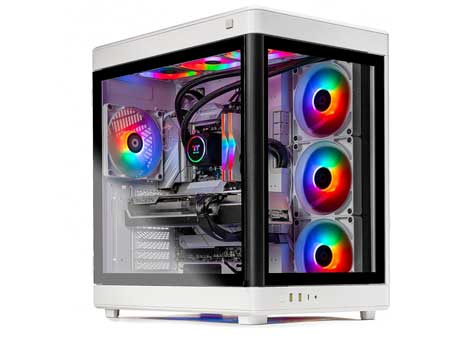 See This On Amazon |
|
| CPU | Ryzen 7 7800X3D |
| Processor Speed | 4.2 GHz |
| GPU | RTX 4070 Ti |
| Graphics Card Memory | 12 GB |
| RAM | 32GB DDR5 |
| Storage Space | 1TB NVME |
| Operating System | Windows 11 |
| Dimensions | 23.4 x 22.9 x 15.9 inches |
| Keyboard & Mouse | Sold Separately |
| Computer Monitor | Sold Separately |
| Advantages | Performnce |
| Disadvantages | n/a |
Skytech Legacy Gaming PC, Ryzen 7 7800X3D 4.2 GHz, RTX 4080 Super, 2TB NVME Gen4, 32GB DDR5 |
|
|---|---|
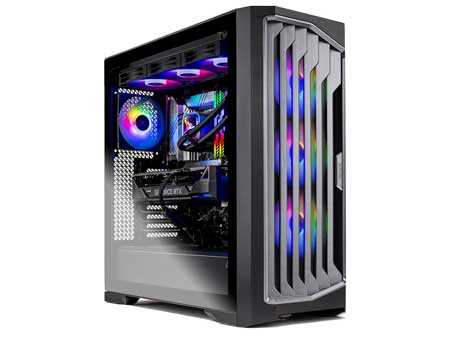 See This On Amazon |
|
| CPU | Ryzen 7 7800X3D |
| Processor Speed | 4.2 GHz |
| GPU | RTX 4080 Super |
| Graphics Card Memory | 16 GB |
| RAM | 32GB DDR5 |
| Storage Space | 2TB NVME |
| Operating System | Windows 11 |
| Dimensions | 24 x 23 x 13 inches |
| Keyboard & Mouse | Sold Separately |
| Computer Monitor | Sold Separately |
| Advantages | Value, Performance, Storage |
| Disadvantages | N/A |
MSI Aegis RS Gaming Desktop, 13th Gen Intel Core i7-13700F, GeForce RTX 4060, 32GB RAM, 2TB SSD |
|
|---|---|
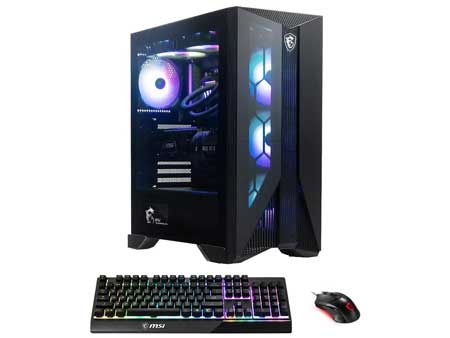 See This On Amazon |
|
| CPU | Intel Core i7-13700F |
| Processor Speed | 5.2 GHz |
| GPU | GeForce RTX 4060 TI |
| Graphics Card Memory | 8 GB GDDR6X |
| RAM | 32GB |
| Storage Space | 2TB SSD |
| Operating System | Windows 11 |
| Dimensions | 16.93" x 8.46" x 17.72" |
| Keyboard & Mouse | Included |
| Computer Monitor | Sold Separately |
| Advantages | Performance, Price |
| Disadvantages | n/A |
ROG Strix GA15DH Gaming Desktop PC, AMD Ryzen 7 3800X, GeForce RTX 2070 SUPER, 16GB DDR4 RAM, 512GB PCIe SSD + 1TB HDD |
|
|---|---|
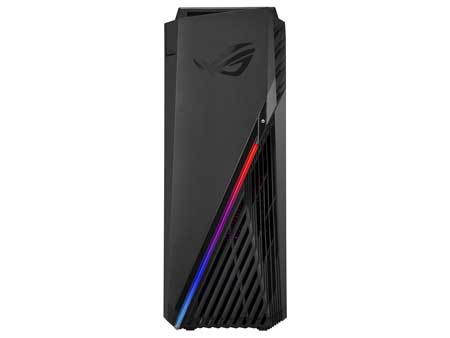 See This On Amazon |
|
| CPU | AMD Ryzen 7 3800X |
| Processor Speed | 4.5 GHz |
| GPU | GeForce RTX 2070 SUPER |
| Graphics Card Memory | 16 GB |
| RAM | 16GB DDR4 |
| Storage Space | 512GB PCIe SSD + 1TB HDD |
| Operating System | Windows 11 |
| Dimensions | 42.1 x 7.3 x 19.6 inches |
| Keyboard & Mouse | Sold Separately |
| Computer Monitor | Sold Separately |
| Advantages | Design, Quality build, value for money |
| Disadvantages | None |
CyberpowerPC Gamer Master Gaming PC, AMD Ryzen 5 7600 3.8GHz, GeForce RTX 4060 8GB, 16GB DDR5, 500GB NVMe SSD |
|
|---|---|
 See This On Amazon |
|
| CPU | AMD Ryzen 5 7600 |
| Processor Speed | 3.8GHz |
| GPU | GeForce RTX 4060 |
| Graphics Card Memory | 8GB |
| RAM | 16GB DDR5 |
| Storage Space | 500GB NVMe SSD |
| Operating System | Windows 11 |
| Dimensions | 23.2 x 22.2 x 12.6 inches |
| Keyboard & Mouse | Included |
| Computer Monitor | Sold Separately |
| Advantages | Performance |
| Disadvantages | Storage |
RELATED DESKTOP PC RECOMMENDATIONS:
Best Desktop PCs for Music Production

